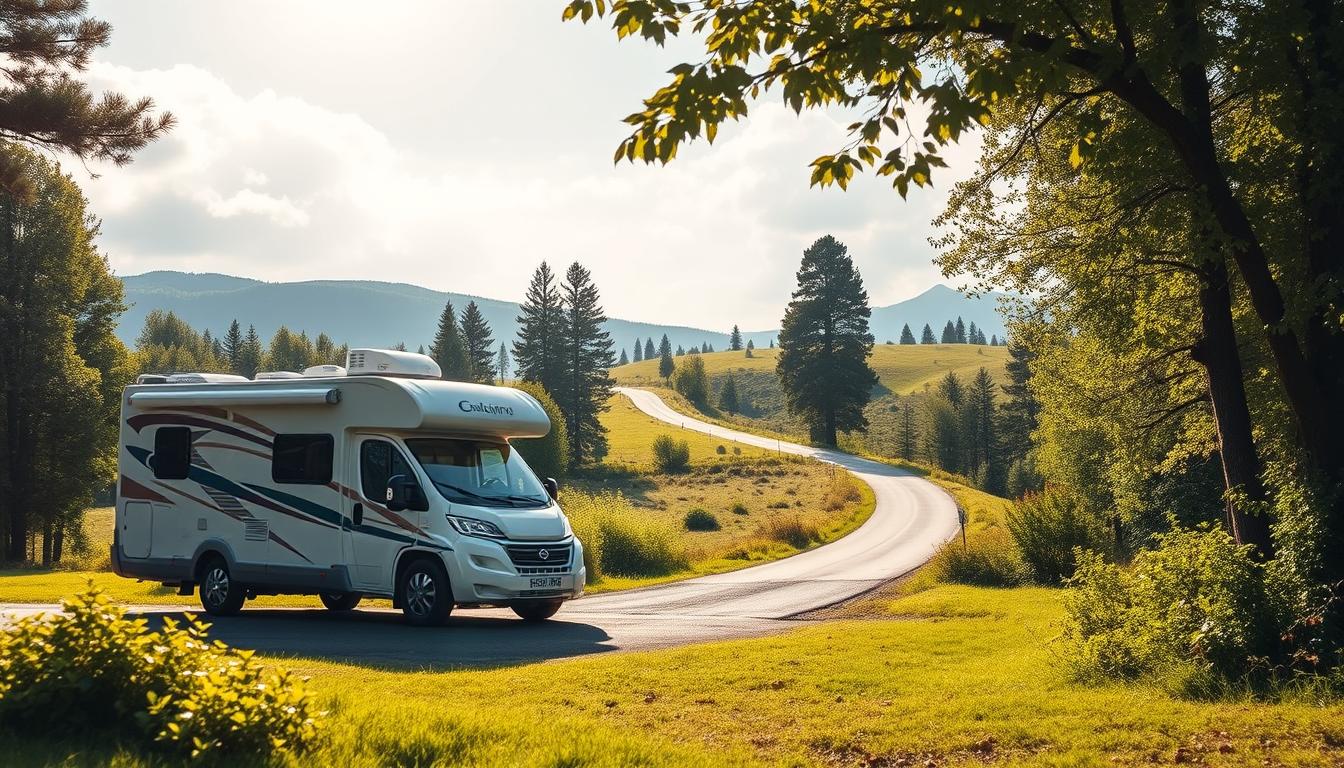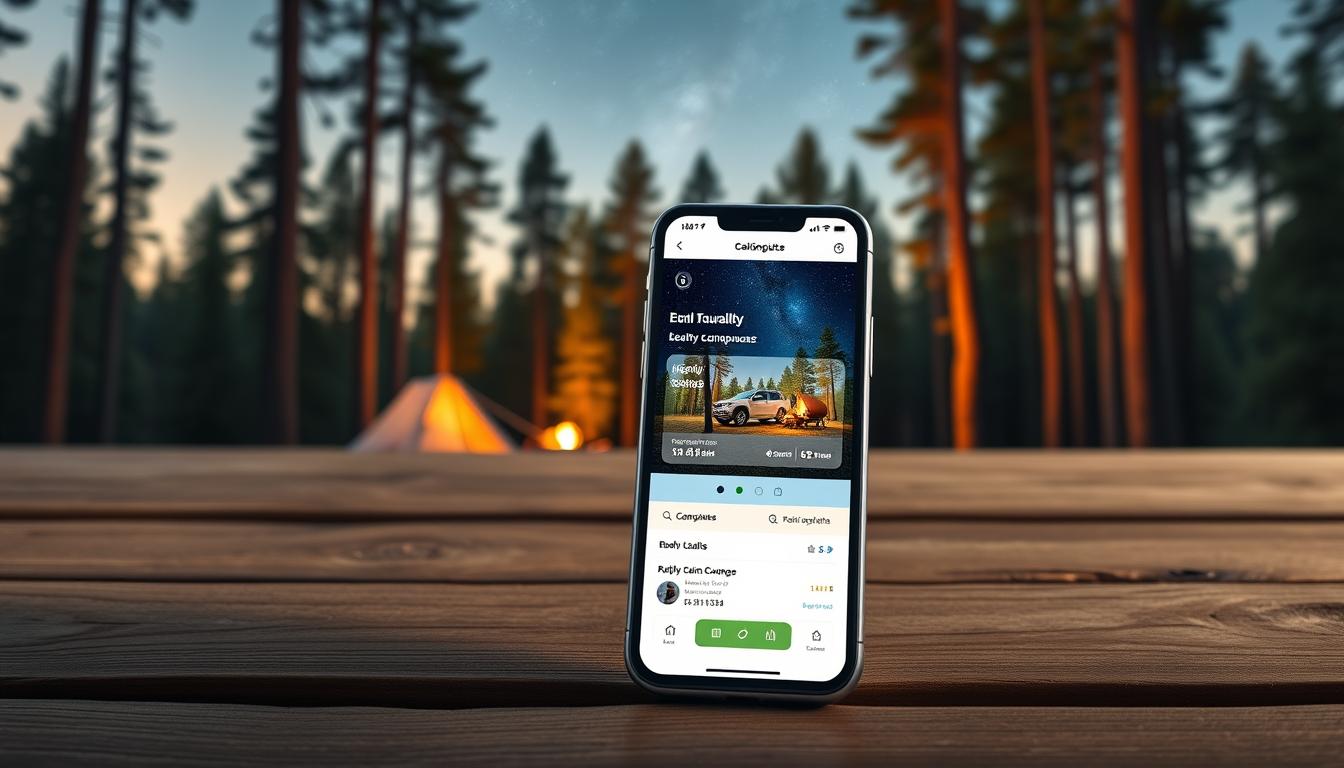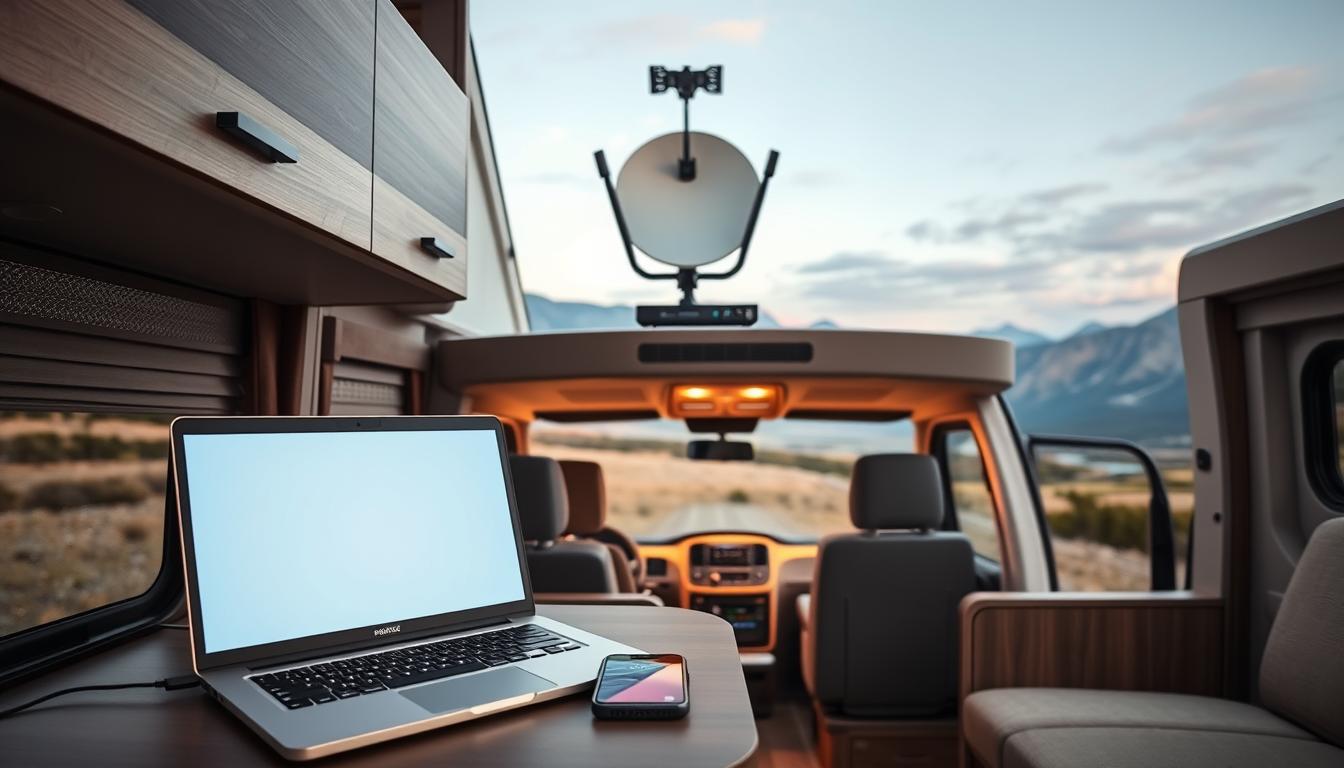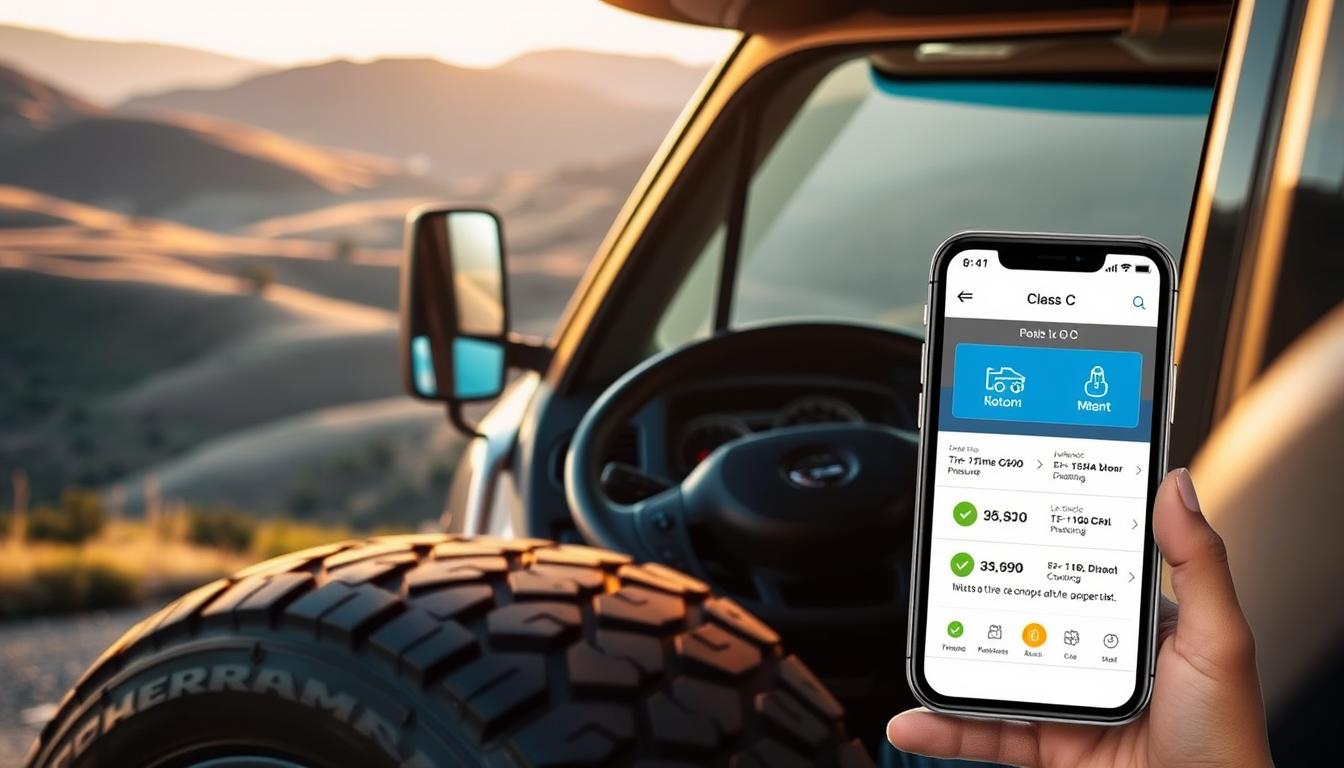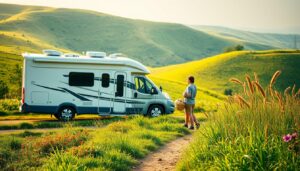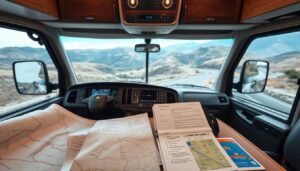Trip planning respecting environmental restrictions with tools for Class C motorhomes
Are you ready to go on an adventure in a Class C motorhome? But, you’re worried about the environmental rules? In today’s world, traveling green is more important than ever. This guide will show you how to plan your trips in a way that’s good for the planet.
It will also make your travels better. With the right tools and knowledge, you can explore the world in a motorhome. And, you’ll do it without harming the beautiful places you visit.
Understanding Environmental Restrictions in RV Travel
Environmental restrictions help keep our ecosystems and landscapes beautiful. These rules change a lot depending on where you are. They might limit campfires, control RV sizes, or set up special campsites to protect wildlife.
RV travelers need to know the RV travel regulations in each place. Breaking these rules can lead to fines or even being banned. It’s also important to respect nature and the local communities.
Many places have rules to reduce our impact on the environment. For example, they might stop off-road driving to prevent erosion. Or, they might limit how many people can camp in certain spots. Following these rules helps protect the environment for the future.
For a great RV trip, look for eco-friendly camping spots and check the local rules. Being prepared and informed lets you enjoy your trip while helping the environment.
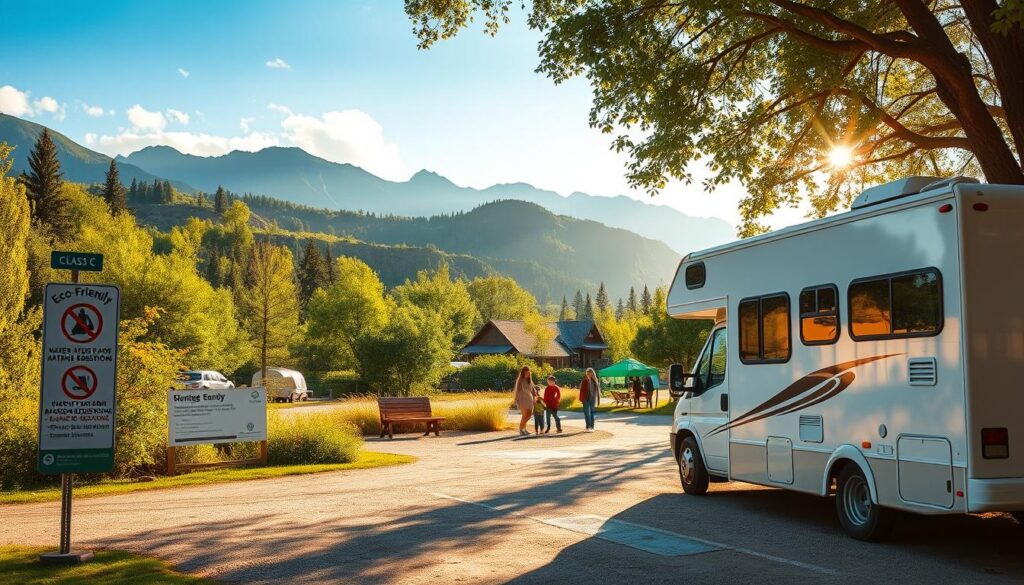
The Importance of Eco-Friendly Travel Practices
Using eco-friendly travel practices is key to sustainable tourism. It helps keep our natural resources safe for the future. By traveling in an eco-friendly way, we reduce waste and save energy.
Choosing places that care about the environment makes a big difference. It helps local ecosystems and lets us enjoy nature fully. Sustainable tourism also makes us and our hosts more aware of our impact on the planet.
We can do many things to be more eco-friendly while traveling. For example, we can use reusable items and take public transport. Supporting local businesses that care about the environment keeps our world beautiful and gives us real cultural experiences.
By choosing eco-friendly travel, we show its value to others. This helps keep our planet’s wonders for future generations to see and enjoy.
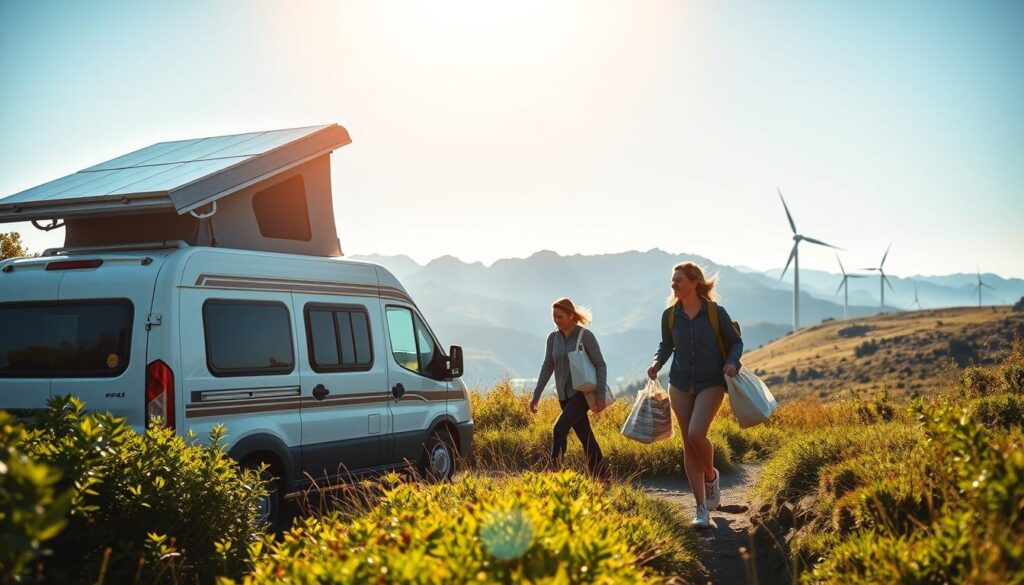
Choosing the Right Class C Motorhome for Eco-Touring
Choosing the right Class C motorhome for eco-touring is important. You need to think about fuel efficiency and emissions. These factors help reduce your environmental impact while traveling.
Class C motorhomes offer comfort and good fuel efficiency. They are great for exploring the outdoors while being eco-friendly.
Assessing Fuel Efficiency and Emissions
When picking a Class C motorhome, look for ones that use less fuel and have low emissions. Different engines affect how much fuel a motorhome uses. Choose models with higher mpg ratings, like 15-20 mpg.
Also, pick a motorhome that meets strict emissions standards. This choice helps reduce your environmental impact. It’s important to find a balance between power and being eco-friendly.
Considering Size and Weight for Environmental Impact
The size and weight of your motorhome affect its fuel use and emissions. Bigger motorhomes use more fuel and produce more emissions. So, choose a size that fits your travel needs without being too big.
Lighter motorhomes use less fuel, which is good for eco-touring. A well-chosen Class C motorhome boosts comfort and supports sustainability on your adventures.
Essential Tools for Trip Planning with Environmental Restrictions
Planning a trip that respects the environment needs the right tools. Using the best trip planning tools makes the journey better and greener. Thanks to RV apps and other resources, traveling responsibly is easier than ever.
Apps for Route Planning and Environmental Awareness
Mobile apps are key for planning trips with an eye on the environment. Apps like Campendium and AllStays help find green camping spots. They offer info on amenities and local rules, making planning easier and eco-friendly.
Using GPS Systems Designed for RVs
RV GPS systems are a big help. They guide you around obstacles and narrow roads. These systems also show environmentally sensitive areas, helping you follow the rules. It makes traveling more enjoyable and shows the importance of caring for the planet.
Researching Eco-Friendly Campgrounds
Travelers who care about the planet find researching eco-friendly campgrounds key to their trips. These places focus on protecting the environment. They offer recycling and ways to manage waste sustainably.
By doing camping research, RVers find spots that care for nature. This makes their trips better and helps the planet.
Using websites and apps for green camping helps RV fans find the right places. These tools show where to camp in a way that’s good for the earth. Choosing to camp in places that care about the environment is a big part of traveling responsibly.
Tools for Planning Trips with Environmental Restrictions for Class C RV
Planning a trip with environmental rules in mind needs the right tools. For Class C RV travelers, online tools and platforms are key. They offer essential information on sustainable campsites and eco-friendly stops.
Online Resources for Finding Green Campsites
Many websites are great for finding eco-conscious campsites. The National Park Service provides details on environmental rules and sustainable practices. Community forums share tips and experiences, helping travelers find green spots.
Environmental Reviews and Ratings for Campgrounds
Travel platforms offer environmental reviews and ratings for campsites. These help make informed choices, focusing on energy-efficient facilities and conservation. Campers use these reviews to choose sites that support responsible travel.
Understanding Boondocking and Its Environmental Impact
Boondocking, or dispersed camping, lets RV travelers enjoy nature without the crowds. It’s a way to camp that’s kinder to the environment. By camping in remote spots, you use less fuel and rely less on campsite utilities. This makes outdoor adventures more eco-friendly.
Benefits of Dispersed Camping
Dispersed camping has many perks for both you and the planet:
- Solitude: Find peace away from the noise of busy campgrounds.
- Connection with Nature: See amazing views and wildlife in their natural homes.
- Lower Carbon Footprint: Using fewer resources means less harm to the environment.
- Customization: Pick your own spot for a unique camping experience.
Responsible Practices While Boondocking
Boondocking means being mindful of the environment:
- Leave No Trace: Clean up after yourself and respect the land.
- Research Regulations: Know the local rules to camp responsibly.
- Safety First: Pack the right gear for safe adventures in the wild.
- Respect Wildlife: Keep a safe distance and don’t feed animals to protect both you and nature.
Preparing for Off-Grid RV Adventures
Going on off-grid camping can change your life. It lets RV fans connect with nature and reduce harm to the environment. To have a green RV trip, you need to prepare well, especially for water and power.
Water Conservation Techniques and Gear
Start by choosing the right water-saving RV fixtures. Switch to low-flow showerheads and faucets to use less water. Collecting rainwater, if allowed, is another smart move.
Small changes like shorter showers or using water bottles can also help. This keeps your water supply up while you enjoy nature.
Carrying extra water containers means you can stay longer without needing to refill often. This helps keep your RV trip green by avoiding trips that harm nature.
Power Supply Management During Off-Grid Stays
Managing power is key for a comfy off-grid camping trip. Portable solar panels are great for clean energy. They’re quiet and don’t pollute like gas generators.
Knowing how to use your RV’s appliances wisely saves energy. Plan your power use to make your trip last longer. With smart planning, RV fans can have great off-grid adventures while caring for the planet.
Connecting with Nature Through Eco-Tourism
Eco-tourism lets travelers really connect with nature while traveling sustainably. It makes us more aware of local ecosystems and helps us appreciate different landscapes. By doing eco-tourism, we learn how important it is to protect the environment.
Travelers who go on eco-friendly adventures become nature’s advocates. They often help with conservation efforts that protect local plants and animals. This turns travel into a meaningful journey of learning and respect for nature. It makes us more responsible for taking care of our planet.
Respecting Local Wildlife and Natural Landscapes
Exploring local wildlife and enjoying nature can be very rewarding. But, we must do it in a way that doesn’t harm these precious places. Knowing a few important rules is key.
Understanding Leave No Trace Principles
Leave No Trace principles help us enjoy the outdoors responsibly. They keep our natural landscapes beautiful and make our experiences better. Here are some key rules to follow:
- Plan Ahead and Prepare: Learn about your destination to reduce your impact.
- Travel and Camp on Durable Surfaces: Use trails and campsites to avoid damage.
- Dispose of Waste Properly: Use bins or take your trash with you.
- Minimize Campfire Impact: Cook with a stove and keep fires small.
- Respect Wildlife: Keep a distance and don’t feed them.
Best Practices for Animal Encounters
It’s important to interact with wildlife in a responsible way. This keeps both visitors and animals safe. Here’s how to do it right:
- Keep a safe distance to let animals act naturally.
- Don’t feed animals to avoid making them dependent on humans.
- Follow local rules for wildlife interactions and stay calm when you meet animals.
- Teach others about protecting wildlife too.
By following these camping best practices, we can enjoy nature’s beauty. And we can help protect the wildlife that lives there.
Setting Up Camp with Environmental Considerations
When you go camping, it’s key to set up your campsite in a way that’s good for the environment. Choosing the right spot and using eco-friendly practices are crucial. This helps keep nature around you untouched.
Eco-Friendly Camp Setup Tips
Using eco-friendly practices makes your camping trip better for the planet. Here are some tips:
- Choose designated campsites to avoid disturbing wildlife and natural landscapes.
- Set up your camp at least 200 feet away from lakes and rivers to protect water sources.
- Limit campfires and use a portable stove to minimize fire impact.
- Carry out all waste, including biodegradable products, to reduce environmental footprints.
Choosing Sustainable Equipment
Choosing the right gear is important for a green camping trip. Here’s why:
- Biodegradable soap helps in minimizing water contamination, promoting eco-friendly practices.
- Investing in renewable energy tools, such as solar panels, encourages sustainable camping.
- Opt for multi-functional gear to decrease the amount of equipment needed, aiding in lightweight travel.
Daily RV Living Tips Focused on Sustainability
Living sustainably in an RV takes daily effort. It’s important to manage waste well and use renewable energy. These steps help keep your lifestyle green while traveling.
Waste Management Procedures
Managing waste is key for sustainable RV living. Here are some tips to follow:
- Separate Recyclables: Use separate bins for recyclables to cut down on landfill waste.
- Proper Sewage Disposal: Always dump waste at designated stations to avoid pollution.
- Minimize Excess Packaging: Choose products with less packaging to reduce waste.
- Composting Practices: Use a compost bin for organic waste to improve soil at campsites.
Using Renewable Energy Sources in Your RV
Using renewable energy makes RV living better and cuts down on fossil fuel use:
- Solar Panels: Add solar panels to your RV’s roof to power your devices with sunlight.
- Wind Turbines: Look into small wind turbines for electricity, especially in windy spots.
- Battery Storage: Get battery systems to save energy from renewables for later use.
- Energy-Efficient Appliances: Choose appliances that use less power to make the most of renewable energy.
Driving Practices that Minimize Environmental Footprint
For RV lovers, eco-friendly driving is key to lessening their environmental footprint. By using smart driving methods, you can save fuel and make your RV trips more efficient. Making a few simple changes in how you drive can greatly improve your fuel use and cut down on emissions.
Fuel-Efficient Driving Techniques
Changing how you drive can make your RV trips better. Here are some important tips:
- Maintaining steady speeds: Don’t speed up and slow down too much to save fuel.
- Reducing idling time: Turn off the engine when stopped for a while to save fuel.
- Optimal tire pressure: Check and keep your tire pressure right to use less fuel.
These tips can really cut down on fuel use. By focusing on driving smoothly and efficiently, you can reduce emissions and travel more sustainably.
Identifying RV-Friendly Routes with Less Impact
Choosing the right roads can also save fuel. RV-friendly routes often skip steep hills and tight roads, which waste fuel. To travel better, think about:
- Using RV-specific navigation apps for the best routes.
- Steering clear of busy spots to avoid idling and wasting fuel.
- Planning scenic drives that are good for fuel and fun.
By using these tips, you can make your trips greener and more eco-friendly. This helps in saving resources and reducing emissions.
Engaging with Local Communities and Conservation Efforts
RV travelers can make their trips more rewarding by connecting with local communities. This helps in promoting conservation efforts. By doing so, they gain insights into native ecosystems and sustainable practices.
Getting involved in local events helps RV travelers support the economy. They can help local businesses grow by shopping and dining there. Joining clean-up efforts or conservation projects also strengthens bonds with the locals.
Local tips can lead RV travelers to hidden conservation spots. These places focus on preserving nature and wildlife. Such experiences make trips more than just travel; they become chances to learn and grow.
Being part of the community and conservation efforts is good for the environment. It also creates lasting memories and friendships. So, every road trip becomes a journey of discovery and responsibility.
Planning Your Route with Environmental Restrictions in Mind
Planning your RV route needs careful thought about the environment. Specialized mapping tools help find routes that are beautiful and protect nature. These tools show paths that are good for the planet and fun to travel.
Utilizing Mapping Tools for Scenic and Eco-Friendly Routes
Today’s navigation apps make planning routes easier and greener. They show eco-friendly paths, like scenic byways and green campgrounds. Using these tools makes your trip more enjoyable and helps the environment.
Conclusion
Embracing sustainable travel is key to making your RV trips better and protecting nature for the future. By using eco-friendly tips and tools, you can plan trips that are good for the environment. This way, you enjoy your journey more and help keep the places you love beautiful.
Good RV planning means finding eco-friendly campgrounds and using tools for green routes. With this knowledge, you can make choices that help the planet and still have amazing adventures. This approach makes your travels both enjoyable and meaningful.
Starting to be more eco-friendly is all about making small, smart choices. By being mindful of nature and local cultures, your RV trips become more rewarding. You’ll create lasting memories and help make the planet a bit greener.
FAQ
What are environmental restrictions for RV travel?
Environmental restrictions help protect nature and reduce human impact. They include campfire bans and limits on RVs in sensitive areas. They also guide where to camp to keep wildlife safe.
How can I ensure my Class C motorhome is eco-friendly?
Choose a Class C motorhome that’s fuel-efficient and has low emissions. Look for models with good mpg ratings. Also, consider the size and weight to use less fuel and harm the environment less.
What apps can help with planning eco-friendly RV trips?
Apps like Campendium and AllStays help find eco-friendly campsites. They give info on environmental rules and help plan trips efficiently.
What is boondocking and its benefits?
Boondocking means camping away from regular campgrounds. It’s better for the environment because it uses less fuel and utilities. It also lets you connect more with nature.
How can I conserve water while RVing off-grid?
Use water-saving fixtures and collect rainwater if you can. Plan your water use and carry extra containers. This helps you stay longer without needing to refill often.
What are Leave No Trace principles?
Leave No Trace principles help keep the environment clean. They include planning ahead, disposing of waste right, and respecting wildlife. These practices protect local ecosystems.
How can I engage with local communities during my travels?
Interacting with local communities makes your RV trip better. Support local shops, join conservation efforts, and learn about their ways. This helps the environment and boosts the local economy.
What renewable energy options are available for RVs?
RVs can use portable solar panels and wind turbines. These green energy sources cut down on fossil fuel use. They’re great for powering your RV on the go.
How do I manage waste effectively while RVing?
Manage waste by separating recyclables and disposing of sewage right. Use composting and buy less packaging. These steps keep campsites clean and support sustainability.
